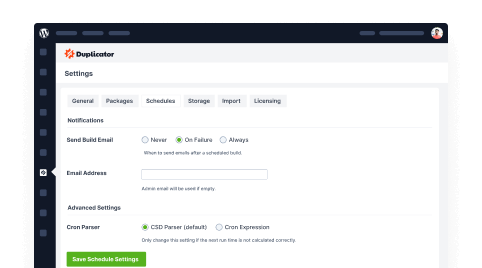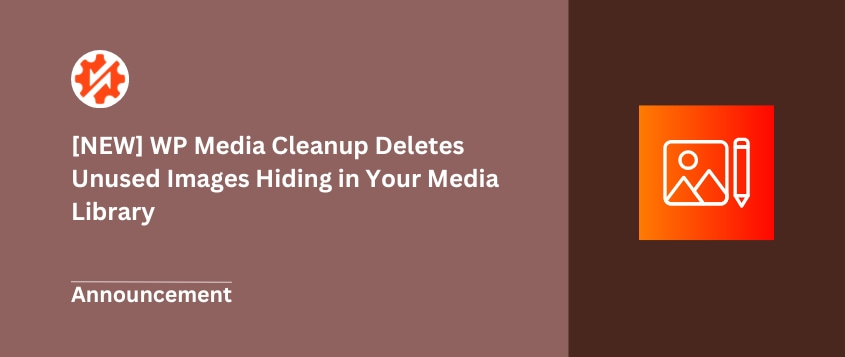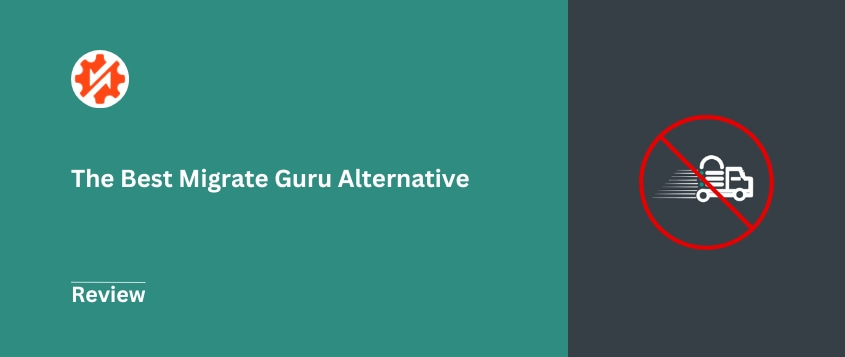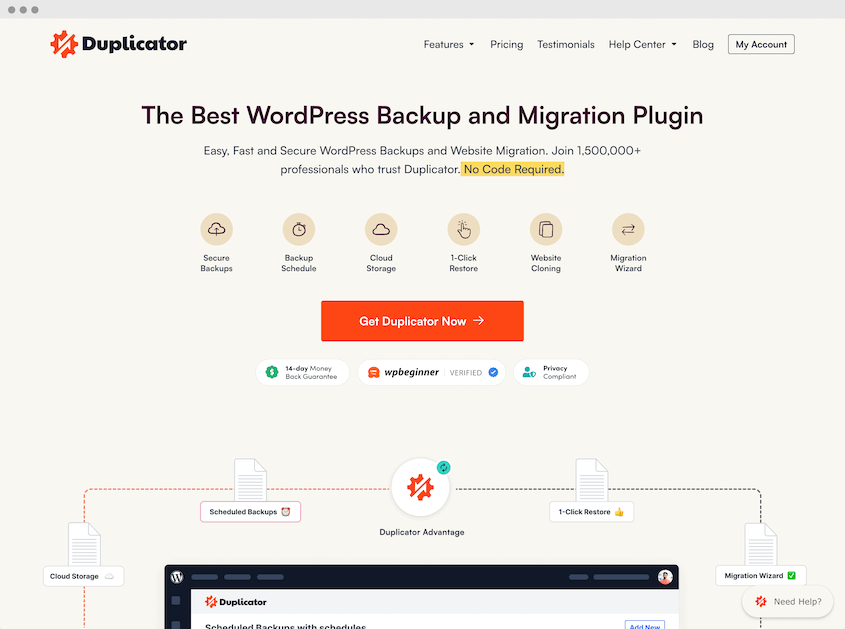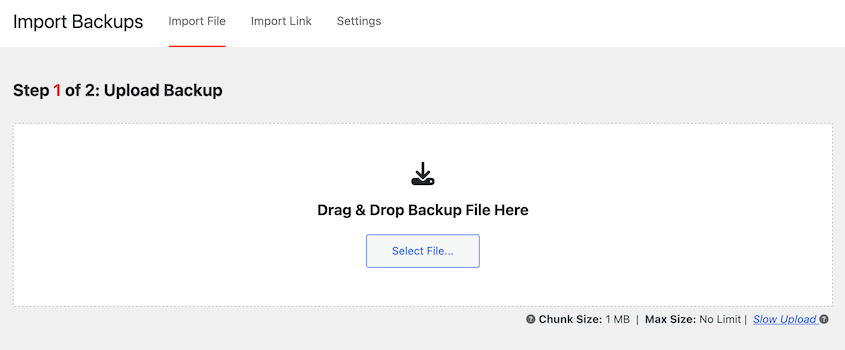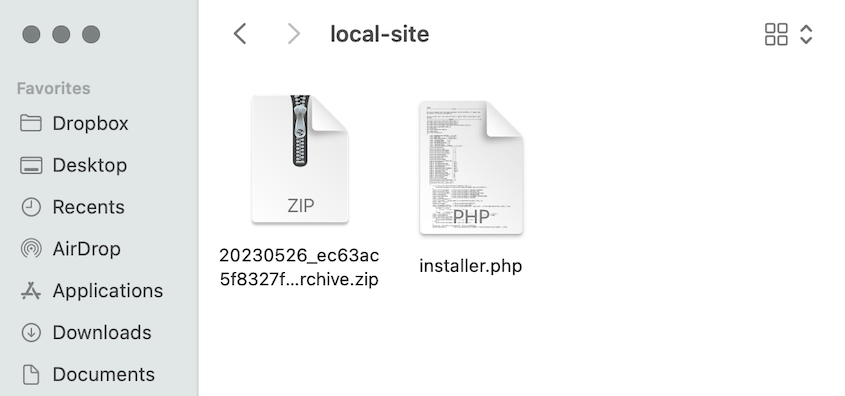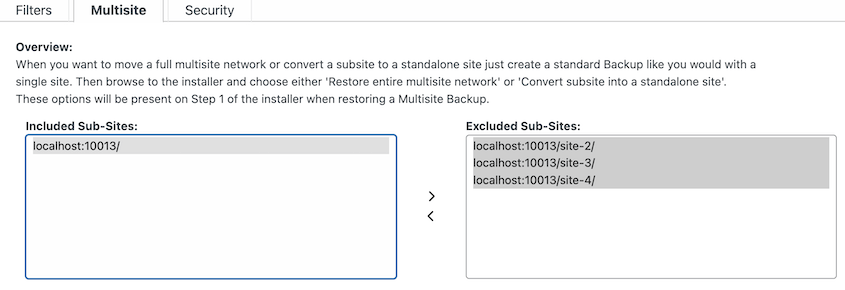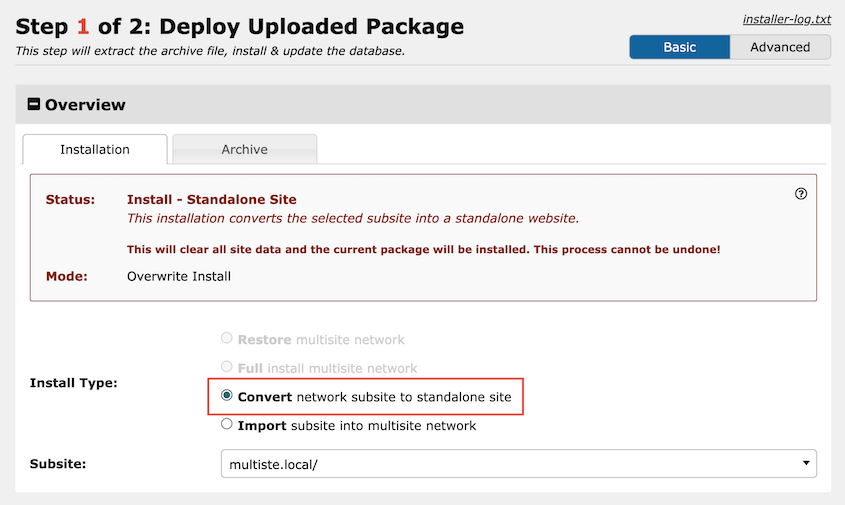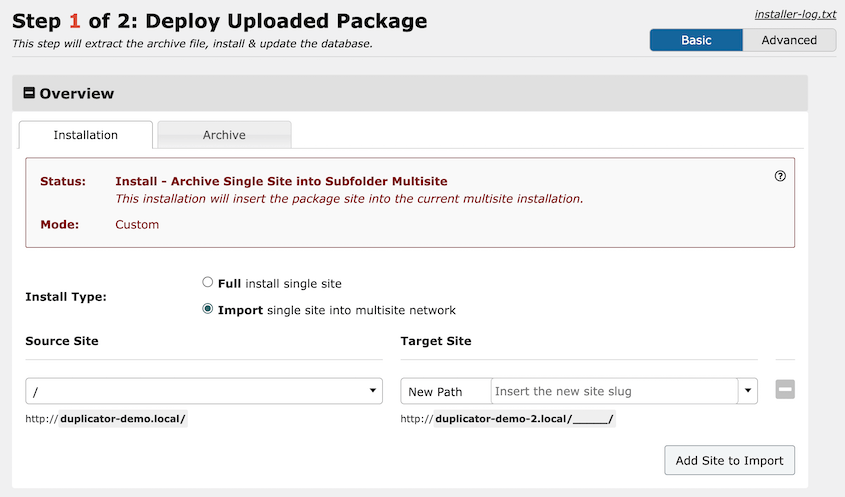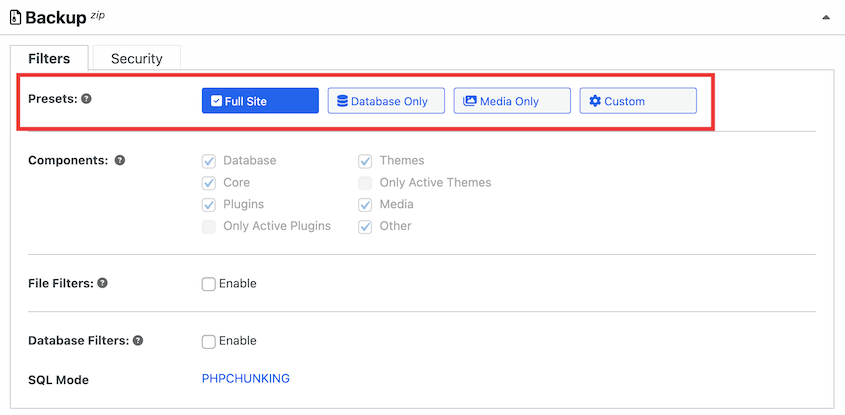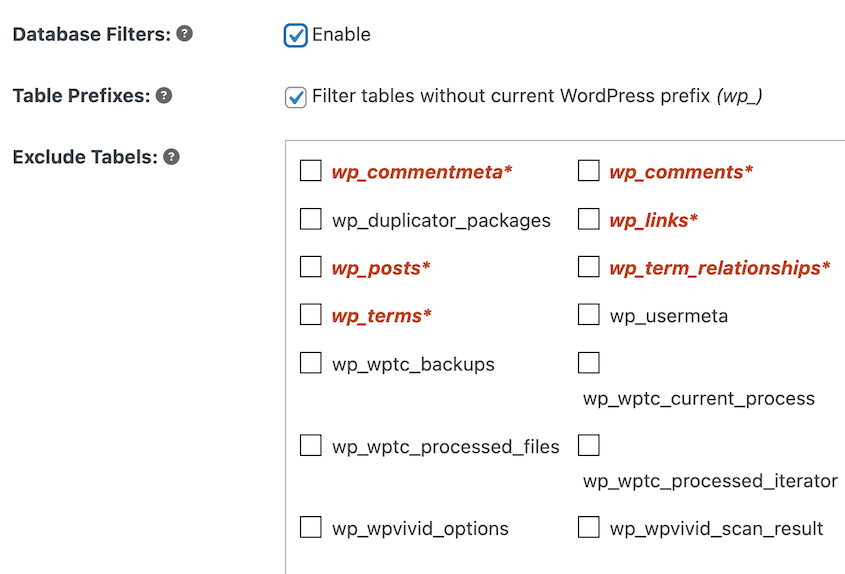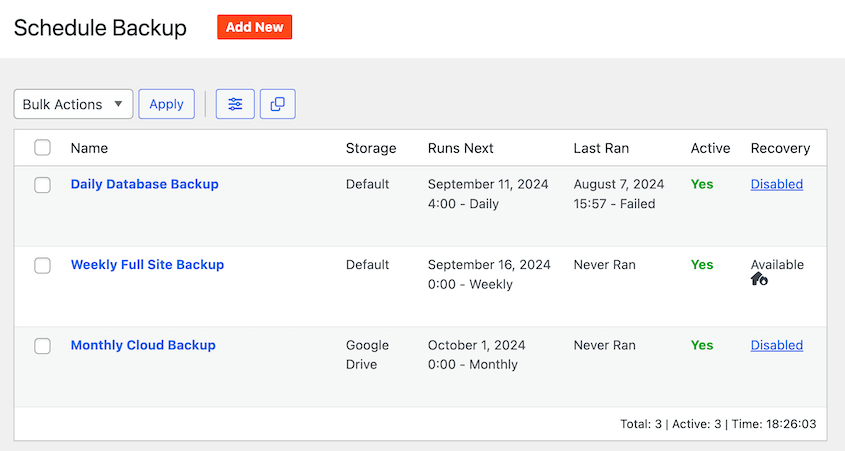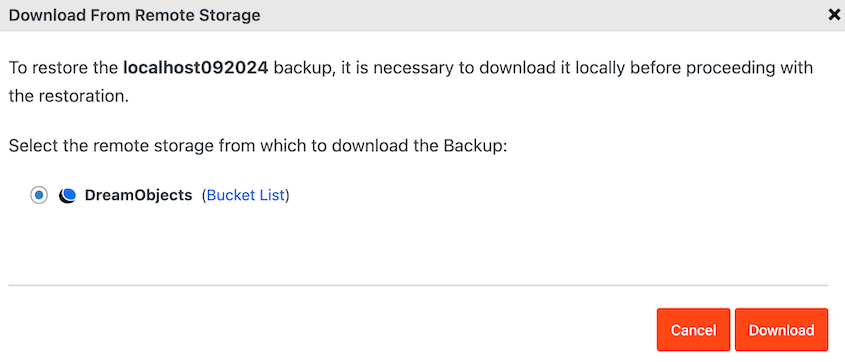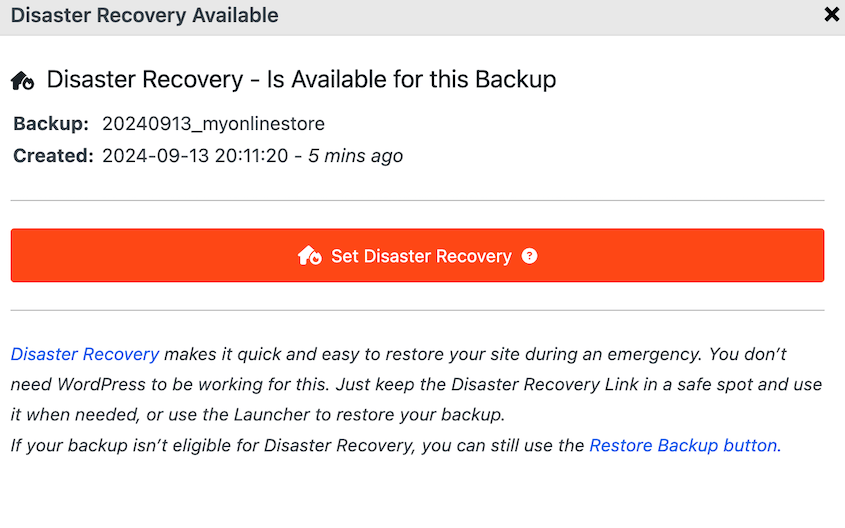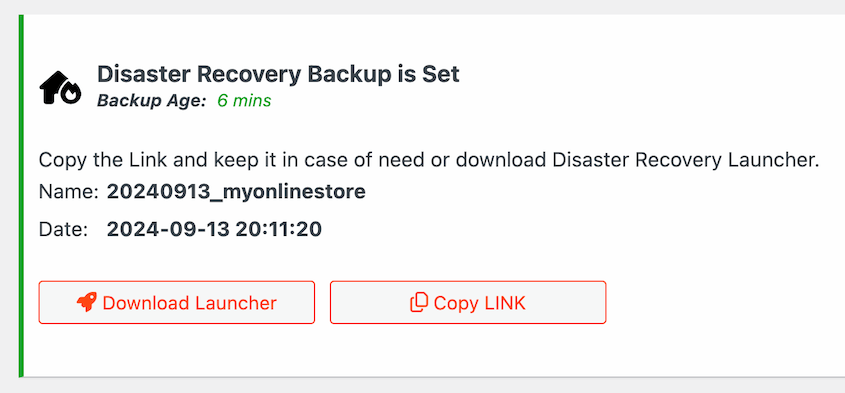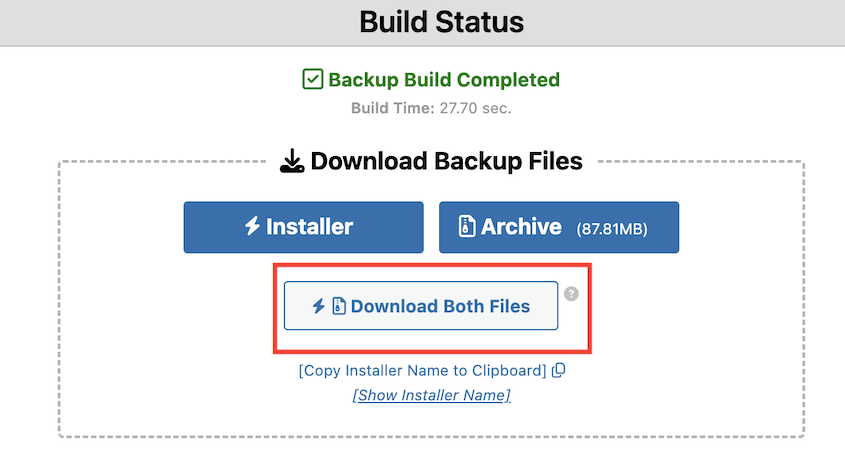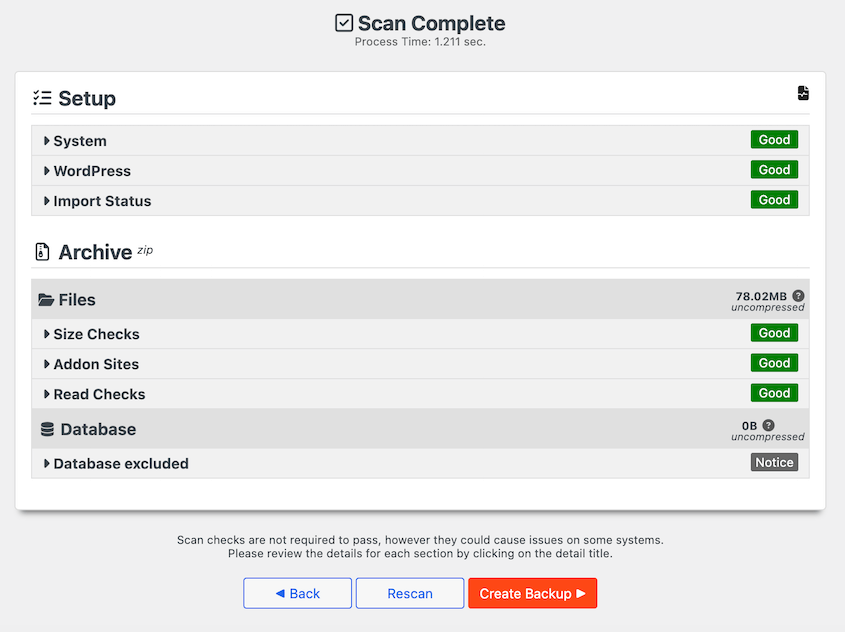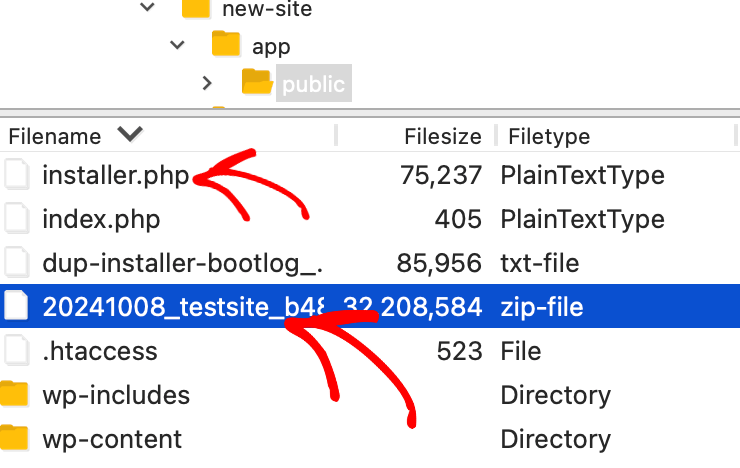If you’re reading this, I’m guessing you’ve run into one of Migrate Guru’s walls.
Maybe you tried to move a site to your local development environment and discovered it simply can’t do that. Or perhaps you’re uncomfortable with your client’s sensitive data being processed on someone else’s servers.
Don’t get me wrong—Migrate Guru does one thing reasonably well. For basic host-to-host moves where you don’t need much control, it gets the job done.
The real issue isn’t what Migrate Guru can do. It’s everything it can’t do.
When you’re managing multiple client sites, building a localhost staging site, or handling complex migrations, you need a tool that gives you complete control over the process. You need something that keeps your data secure.
That’s where Duplicator comes in. It’s a complete backup, migration, and recovery platform designed for developers and site owners who can’t afford to compromise on security, flexibility, or control.
Here are the key takeaways:
- Migrate Guru processes your data on third-party servers, while Duplicator keeps everything on your own server for better security
- Duplicator handles localhost migrations, multisite migrations, and backup filtering—features Migrate Guru doesn’t have
- You get automated backups, one-click restore, disaster recovery, and cloud storage integration in one tool
- Duplicator works without WordPress pre-installed at the destination, saving setup time
Table of Contents
Why Look for a Migrate Guru Alternative?
Let’s talk about where Migrate Guru falls short. If you’ve been using it for basic migrations, you’ve probably started bumping up against these limitations.
Lack of Control
If a Migrate Guru migration fails, you’re left guessing what went wrong. The entire process happens in a black box on their servers.
You can’t filter out unnecessary files to speed up the migration. You can’t exclude specific database tables. You can’t even see detailed logs to troubleshoot issues.
For developers who need to understand and control every aspect of their workflow, this lack of transparency is frustrating. We need tools that work with us, not against us.
Limited Functionality
Migrate Guru moves sites well from one live host to another, but that’s about it. Site management and development work involves so much more.
You need to pull sites down to a local host for safe testing. You might have to migrate a single sub-site out of a multisite network. Or maybe you want to set up automated backups alongside your migrations.
None of these workflows are possible with Migrate Guru. It’s built for one specific scenario, and if your needs fall outside that narrow scope, you’re out of luck.
The Best Migrate Guru Alternative: 11 Reasons to Switch to Duplicator
Duplicator is a WordPress migration and backup plugin that actually puts you in control of the process. Instead of sending your data through third-party servers, it handles everything locally on your own hosting environment.
I’ve been using Duplicator for years across many client projects, and these are the features that consistently make the difference between a smooth migration and a frustrating experience.
Here’s what makes Duplicator the superior choice:
- Your Data Stays on Your Server: No third-party processing means complete data security and control
- Migrate Websites Even If WordPress Isn’t Installed First: Drop the installer on any blank server directory
- Migrate Your Website to a Local Host: Essential for professional development workflows
- Migrate Multisite Sub-Sites to a Different Domain: Extract individual sub-sites as standalone installations
- Migrate a Standalone Site to a Multisite Network: Import existing sites into your network easily
- Migrate Specific Data with Backup Filtering: Exclude unnecessary files and database tables
- Effortlessly Handle Any Size Website: Chunk-based processing handles sites over 400GB
- Schedule Automatic Backups: Hourly, daily, weekly, or monthly automated protection
- Restore Your Website in One Click: Roll back to any previous state from your dashboard
- Recover Your Completely Broken Website: Disaster recovery works even when you can’t access WP-Admin
- Store Backups Safely in the Cloud: Integrates with 12+ cloud storage providers for off-site protection
Your Data Stays on Your Server
When you create a Duplicator backup, everything happens directly on your server. No third party ever touches your files or database.
The WordPress plugin builds your migration package right where your site lives, then hands you the files to move however you want.
Your client data never leaves your control, which means you can confidently handle sensitive projects without worrying about compliance issues or data breaches.
For financial services sites, medical practices, and government contractors, data security isn’t negotiable. Having that peace of mind makes all the difference.
Migrate Websites Even If WordPress Isn’t Installed First
With Migrate Guru, you need WordPress already installed at your destination. That means extra setup steps and potential version conflicts.
Duplicator packages include everything—WordPress core, your theme, plugins, uploads, and database. You can drop the installer on any server directory (even a completely blank one), and it sets up the entire site from scratch.
This saves serious time, especially when you’re deploying to new environments or testing different server configurations.
Migrate Your Website to a Local Host
Professional WordPress development happens locally first.
Whether you’re building a new site from scratch or pulling down a live site for debugging, local development is fundamental to good workflow.
Migrate Guru can’t handle localhost migrations at all. Duplicator makes it as simple as any other migration.
You can build your new local site on a platform like LocalWP. If you install WordPress, all you’ll need to do is drop your backup into the new site.
For local development platforms like MAMP or WAMP, upload both Duplicator backup files to your local site’s root folder.
You can then launch your new local site without installing WordPress! Just search for http://localhost/your-site-folder/installer.php in a browser window, and Duplicator will install your backup for you.
Migrate Multisite Sub-Sites to a Different Domain
Here’s a scenario that comes up more often than you’d think: a client has been running their blog as a sub-site in a multisite network, but now they want it as a standalone site on its own domain.
Duplicator Pro handles this complex process easily. It supports multisite networks, allowing you to create an independent backup of the single sub-site.
Download this backup and upload it to the standalone server. Duplicator will adjust all the database references and create a completely independent WordPress installation.
This is something that Migrate Guru can’t do, and you might need that flexibility in your development workflow.
Migrate a Standalone Site to a Multisite Network
Sometimes you need to take an existing WordPress site and import it as a new sub-site within a multisite network.
This involves complex database transformations and URL adjustments that would take hours to do manually.
Duplicator Pro makes multisite management actually manageable. Create a backup of the single site and import it into the network.
Follow the step-by-step migration wizard, and you’ll have one more sub-site on the network!
Migrate Specific Data with Backup Filtering
Not every migration needs to include everything. Maybe you have a 10GB cache directory that doesn’t need to move. Or maybe your site has old backup files eating up space.
Duplicator lets you exclude specific folders and database tables from your backup. This makes migrations faster and keeps file sizes manageable—especially important when you’re working with hosting providers that have upload limits.
One beginner-friendly way to customize backups is the presets. Click the preset that matches the data you want to back up (Full Site, Database Only, Media Only, or Custom).
There are also custom filtering options. Select specific files and database tables you want to include or exclude from the backup.
You won’t find this level of customization and control with Migrate Guru. You might end up migrating full websites with tons of digital clutter.
Effortlessly Handle Any Size Website
Server timeouts are a common problem with migration tools. Your hosting provider kills the process halfway through, and you’re stuck with a broken migration.
Duplicator avoids this by building archives in smaller chunks. The process can pause and resume, working around server limitations that would crash other tools.
I’ve successfully migrated sites over 400GB this way. The process takes longer, but it works reliably even on shared hosting with strict resource limits.
Schedule Automatic Backups
Here’s where Duplicator becomes more than just a migration tool. You can set up automatic backup schedules that happen hourly, daily, weekly, or monthly.
Your migration tool will double as your disaster recovery system, which means one less plugin to manage and maintain.
Restore Your Website in One Click
When something goes wrong—a plugin update breaks your site, a theme change causes issues—you need to restore quickly.
Duplicator’s one-click restore feature works right from your WordPress dashboard. Select a backup, click restore, and your site rolls back to that exact state.
This even works with backups stored in the cloud. Duplicator will download your data from the third-party service and restore it without you having to leave your dashboard.
Recover Your Completely Broken Website
But what if the damage is worse? What if you can’t even access WP-Admin because of errors like the white screen of death?
That’s where Duplicator’s disaster recovery is extremely valuable. Before errors happen, set a full-site backup as the recovery point.
It’ll give you a disaster recovery link and file. Save each of these in a safe location away from your dashboard. If anything goes wrong, paste the link in a browser window or open the recovery file.
Plus, every backup includes a complete installer that can overwrite your broken site entirely. Upload both backup files via FTP, run the installer, and you’re back online.
This has saved me countless times when my site was completely inaccessible.
Store Backups Safely in the Cloud
Local backups are good, but off-site backups are better. This way, your backups won’t disappear if your website and server go down.
Duplicator integrates with major cloud storage providers including:
Set up automatic cloud storage, and your backups get safely stored off-site without any manual intervention. When your server crashes (and they do crash), your backups are still safe in the cloud.
How to Migrate Your Website with Duplicator
The actual migration process is straightforward. Here’s how it works in practice:
Install the Duplicator plugin on your source site and create a backup. Download the two backup files: an archive containing all your files and database, plus an installer script.
The plugin scans your site first and warns you about any potential issues before building the package. This upfront validation catches problems before they become migration headaches.
Move both files (the archive and installer.php) to your new server using FTP, cPanel File Manager, or whatever method you prefer.
You don’t need WordPress installed at the destination—just drop the files in the directory where you want your site to live.
Navigate to the installer.php file in your browser. The installation wizard walks you through the process step by step.
Enter your new database details, choose your URL settings, and let the installer handle the rest. It extracts your files, imports your database, and updates all the URLs automatically.
That’s it. The entire process usually takes just a few minutes, depending on your site size.
Frequently Asked Questions (FAQs)
What are the best free WordPress migration plugins?
Duplicator Lite is probably the most powerful free option available. Unlike All-in-One WP Migration’s free version, which limits you to tiny 512MB uploads, Duplicator Lite doesn’t impose artificial file size restrictions.
How do I use Migrate Guru?
Install the plugin, select your hosting provider from their list, enter your destination server details, and let their system handle the migration through their servers. Remember—your entire site gets processed on their servers during the transfer.
How do I migrate a WordPress site to a new host manually?
Manual migrations involve downloading files via FTP, exporting your database, uploading everything to the new server, importing the database, editing wp-config.php, and running search-and-replace queries to update URLs. It’s time-consuming and error-prone—exactly why automated tools like Duplicator exist.
What’s a fast way to migrate a WordPress site?
A reliable plugin like Duplicator is your fastest and safest option. Host-specific migration tools can work, but they lock you into their ecosystem and often lack the flexibility you need for complex sites.
The Clear Choice for Professional Developers
Migrate Guru works fine if you need simple host-to-host moves and don’t mind your data passing through third-party servers. But for professional developers who need security, control, and flexibility, it falls short.
Duplicator gives you everything Migrate Guru does, plus all the functionality it’s missing. Local migrations, multisite management, backup scheduling, disaster recovery, and cloud storage—it’s a complete platform rather than a single-purpose tool.
When you’re managing client sites professionally, you need professional tools. Duplicator Pro provides the security, control, and comprehensive feature set that serious WordPress development demands.
Ready to upgrade your migration and backup workflow? Get Duplicator Pro today and experience what professional-grade WordPress management actually looks like!
While you’re here, I think you’ll like these other hand-picked WordPress resources:
Joella is a writer with years of experience in WordPress. At Duplicator, she specializes in site maintenance — from basic backups to large-scale migrations. Her ultimate goal is to make sure your WordPress website is safe and ready for growth.

